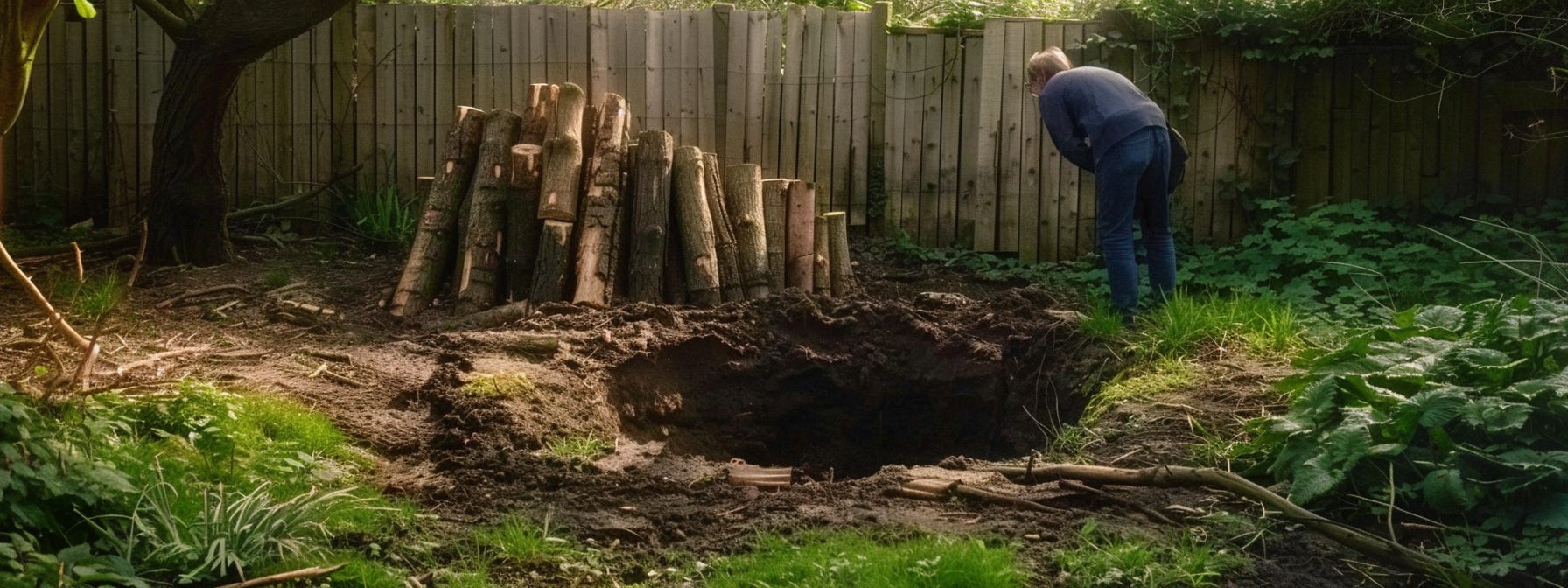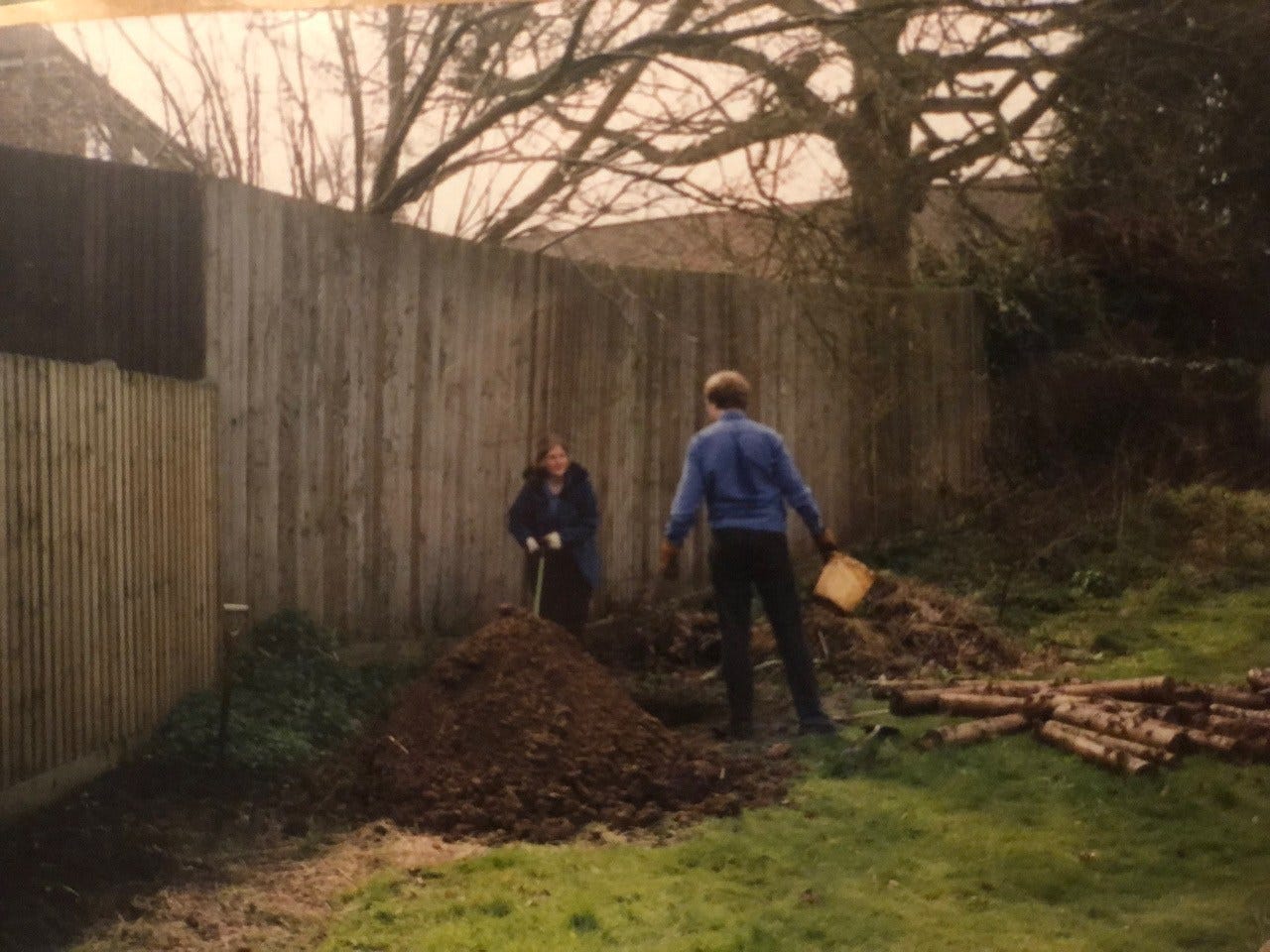I consider the stack of logs in front of me.
“Stag beetles don’t like leylandii. It’s too acidic.”
But my mother is emphatic. She wants a log pile, she wants stag beetles to use it, and she wants to use remains of the thirty foot Leyland cypresses she has had felled at the back of the garden. My brother and I are dragged into another of my mother’s projects—the task expanding as it unfolds. What she has in mind is a ramshackle and literal pile of logs. I, fresh from ecology classes and work on the reserve, have other ideas.
“They really should be dug in. Beetle larvae live underground.”
My mother is dubious.
“But it’s clay.”
I shrug. If a log is worth dragging half way across an Oxford garden, it is worth dragging into a hole. And so, under the shadow of the neighbour’s ancient spreading oak, my brother and I begin to dig.
Of course she is right. This isn’t just any clay, it is life-sucking and energy-sapping, heavy and sticky as hell Oxford clay—millennia of decomposed life and fragmented geology holding tight to the ground. But I am determined. I have committed this portion of my life to excavating this particular hole in this particular corner of this particular garden. I will not be found lacking.
We plough on.
Every leaden spadeful must be lifted and barrowed to the back of the garden where it will form another new landform—a bund—a project for another day. Tomorrow my mother suggests, laughing, even as my back breaks and my feet, heavy in clay-ridden boots, run with sweat under the cold, midday, mid-dig, midwinter sun. Having instigated the task, my mother adopts her usual role of interfering manager, suggesting small changes to shape and position, which we politely acknowledge, then quietly ignore.
She is solicitous with cups of tea and home made shortbread. When she brings out a tray, we step back and consider our progress. It is depressingly slow.
“I’m sure that’s deep enough. I only wanted a small log pile really.”
She looks worried.
Fortified by sugar and caffeine, my brother and I press on. His normally meticulous approach abandoned, my brother now throws himself into the task with absolute and single minded resolution. There is a careful and unspoken solidarity in our activity. Together, we will build our mother a log pile that exceeds her dreams—even if only by sheer force of our combined will. We will prove our worth in mud and tortured muscles.
My mother hovers, concern etched into her face.
“I’m sure that’ll be deep enough.”
The three of us appraise the hole—two feet deep with walls the colour of pale hellish sulphur. It is an ugly amber gash in the dense deep green of moss and lawn. We consider its size and the relative mass of the adjacent logs. There are several dozen—each between four and nine inches across, in lengths from three to seven feet. I realise that however deep I dig, it will never be enough. For me.
I am outvoted and concede defeat.
We begin the second stage—the stage that is all my mother really wanted—building the log pile.
This should be easier than digging, but we are already tired. Fractious. Every log has to be set upright and held in place while others—which also have be be held upright—are stacked around it for stability. It is a frustrating task. We resort to ropes to lash the logs together. Taking it in turns, my brother and I each lend our weight and our aching arms to support the full bulk of the growing vertical pile, while the other shovels earth back in around it, stamping down and compacting particles of soil and clay into pancakes that adhere to our boots and threaten to hold us forever in the core of the earth. With each new layer of soil infilled, we lift weary legs upward another inch toward ground level.
By the time the final blanket of soil has been stamped into place, we are broken.
I lean backwards into a stretch and, feeling my aching back threaten to seize, I carefully unravel myself forward again. The spade which all day I have wielded as a weapon in this clay and timber battle, becomes a necessary physical prop to keep me upright.
My mother’s delight is palpable.
‘It’s huge! It’s a citadel!’
She is right. Upended, at the highest point of the garden, the logs dominate her estate—a fortress of timber and mud and moss—the motte atop the garden bailey—incongruous in this ex-council house garden. I am embarrassed by its immensity. It’s visibility. How did it get so—big?
The next day, my mother takes great pride in showing off The Citadel to the neighbours.
‘Look what the children built for me!’
She preens, septic with pride. My mother is a lone middle class green amongst a sea of working class blues. The worthy wild gardener whose compost, newts and log citadels trump the patios and poisoned begonias that populate adjacent plots.
The neighbours smile weakly and look confused. I watch from the back door, leaning on the doorframe and nursing aching limbs and a cup of tea. They, polite but puzzled. She, a tight bundle of nervous “love-me” energy.
I realise, not for the first time, that we are not normal.
"The Citadel" was first published on Life Writing Projects, a collaboration between The Centre for Life History and Life Writing Research (CLHLWR) and REFRAME. Life Writing Projects was devised and is edited by Professor Lyn Thomas and was designed by Dr Tanya Kant.







“The worthy wild gardener whose compost, newts and log citadels trump the patios and poisoned begonias that populate adjacent plots.” This could be me… never one to conform, never one to blend… and why should I, or your mum? Who wants more normal anyway?
This is wonderful Melinda and reminiscent of my thistle pulling… I am about to begin round two! Some jobs just hurt… plain and simple but damn they are worth it in the end!
Sending a cooling hug for your poor back, I hope there was no lasting damage..xx
Love this story!